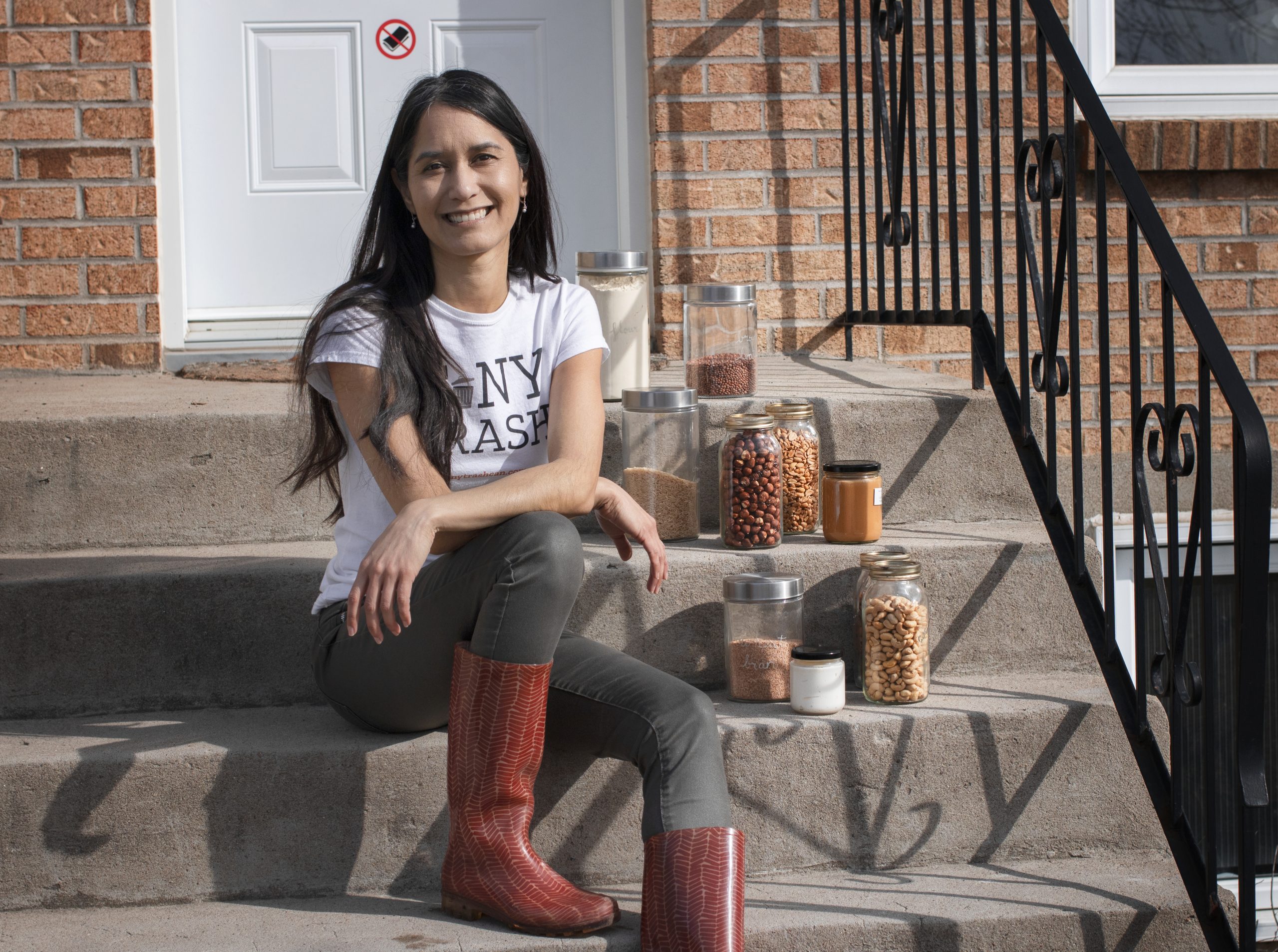How one Montrealer is rethinking her footprint
Like a lot of people, Tippi Thole starts her day with a cup of coffee. She uses an espresso machine, since it doesn’t require paper filters or plastic pods that will end up in the trash later. The only waste generated by Thole’s daily java fix are coffee grounds, which she tosses into the compost bin.
After coffee, Thole prepares breakfast with her 11-year-old son. In order to cut out wasteful packaging, many of the ingredients she cooks with are packaged in compostable material, like cardboard, or purchased in bulk and transported home inside glass jars. If an item isn’t available in sustainable packaging — like tortillas, for example, which are usually sold in sealed plastic bags — she makes it from scratch instead.
Waste is something Thole spends a lot of time thinking about. On her website, tinytrashcan.com, she documents her efforts to lead a “low-waste” lifestyle; by scaling back her consumer habits, giving items a second life, and avoiding wasteful materials like plastic, Thole aims to minimize the amount of trash she creates as much as possible. Aptly titled, the website encourages visitors to “reconfigure” their waste sorting system so that the largest bins are dedicated to recycling and compost, and the smallest bin is dedicated to trash.
I feel like all of us can reduce [our] trash,” said Thole. “It’s something that all of us can do, it’s very attainable.”
Currently based in Montreal, Thole grew up in Missouri in the United States. When she’s not working on tinytrashcan.com, she splits her time between her job as a graphic designer and her recently-acquired role as a teacher to her son, who is homeschooled as a result of the pandemic. Thole’s son is an enthusiastic participant in low-waste living, scribbling math equations on scrap pieces of paper and drawing with coloured pencils instead of plastic-encased markers.
The Concordian sat down for an interview with Thole back in February. Having been featured in publications like The Washington Post, Business Insider, and the CBC, she’s no stranger to media attention. Throughout the interview, she’s relaxed and upbeat, pausing only to take sips of her coffee, courtesy of her aforementioned espresso machine. Although the subject of climate change can certainly be a harrowing one, she maintains a positive mindset when speaking about it. She says her experience with low-waste living has been empowering and uplifting.
What I really like about trash is we can see the impact of our habit changes. We can see that we’re making a difference,” she said. “It creates this positive feedback loop, where the more you do, the more you want to do.”
Thole was inspired to make the change to a low-waste lifestyle after attending a 2017 TEDx talk by activist and researcher Carole Devine called “Cleaning Up Our Plastic Mess.”
“I didn’t really understand the enormity of the problem, and how it wasn’t just a problem in the ocean, it was a problem in the land and air and soil, and all these other places too,” said Thole. “I like to say that action feels better than anxiety, and when I learned about plastic trash, I was like, ‘oh my gosh, I want to do something.’”
In Canada, an alarming 91 per cent of plastics produced each year aren’t recycled, and the numbers are about the same in
Although the problem is overwhelming, Thole decided to do her part by reevaluating the items she brings into her home and where they end up. She set a goal to fill her recycling bin as slowly as possible, so that she only needed to roll it to the curb once a season. Last year, she doubled up on this goal, filling her recycling bin a grand total of two times. That same year, she only took her trash can out once.
I think it’s fun to have goals … because then you start to see those tangible benefits, and it feels so good,” said Thole.
One criticism that the low-waste movement has faced is that it shifts responsibility from large, environmentally-damaging corporations and governmental bodies to individual consumers.
While Thole recognizes the importance of legislation and corporate action when it comes to tackling the climate crisis, she believes that the power of individual citizens should not be underestimated. For one, the more that individuals adopt sustainable habits, such as the use of reusable water bottles, the more those habits spread — and they can spread quickly.
“Governments and businesses, they move at such a slow rate. Whereas, as individuals, we can make this change today,” said Thole. “We don’t have to wait. And I think right now the crisis is at that point where we don’t have time to wait.”
Thole says her son plays a big role behind her quest to make sustainable choices. She says his love for animals and nature has been a great source of inspiration. As the weather warms up, the pair will soon embark upon what they call “litter walks,” when they venture outdoors to pick up trash that was formerly trapped beneath the snow. It’s an activity Thole and her son look forward to doing together.
“[He’s] a huge motivating factor for me, him and really all future generations,” said Thole.
Thole says she feels a moral responsibility to leave the earth “better than [she] found it,” for the sake of our planet’s future.
Feature photo by Christine Beaudoin
